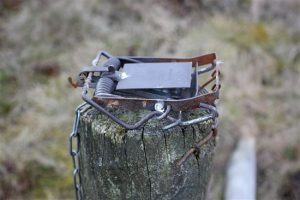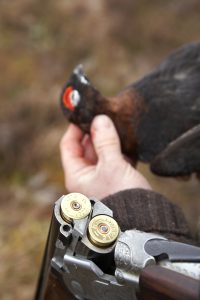RSPB:
Martin Harper helpfully sets out the RSPB case on driven grouse shooting in his blog today ahead of the evidence session tomorrow at 2:15pm.
There is not much between the RSPB and my position when it comes to the litany of problems associated with driven grouse shooting. These arguments have been well rehearsed and Jeff Knott and I should form a harmonious duet for much of the short session. And I’m looking forward to a chat with Jeff ahead of tomorrow’s session so that we don’t trip over each other in our evidence.
The RSPB position is for licensing of shooting estates although we all know that the RSPB failed to support John Armitage’s e-petition on this subject which closed in 2014. Licensing could be a step forward although it would be difficult to design effectively, expensive to monitor and, of itself, would not help limit wildlife crime against protected wildlife (because what we need there is enforcement not regulation (since it is already illegal)). I should, in all modesty, point out that our petition to ban driven grouse shooting received 12 times as many signatures in half the time, which doesn’t suggest a massive groundswell of public opinion in favour of the RSPB’s current favoured option.
I think that the RSPB is beginning to realise that talking about licensing as the solution to something that is already illegal looks a little weak and so they have two other strings to their bow.
The first is a renewed enthusiasm for vicarious liability – a measure that the RSPB also failed to support when Chrissie Harper set up an e-petition calling for it back in 2012. This is something worth pressing for and I would support it tomorrow if asked. I’d be surprised if the Moorland Association or the Countryside Alliance are keen on it, though.
The second is to try to sell to the shooting industry that Langholm II showed the way forward. At the second Langholm study Hen Harriers were fed (so they didn’t eat Red Grouse) and grouse numbers went up – although they did not reach a predetermined level agreed to represent viability for shooting (apparently, even though this contradicts previous and existing thresholds – the bar was set rather high!). This hasn’t found any favour with the grouse shooting so-called industry. Their response to the emerging results of Langholm was publicly to argue that the solution to there being hardly any Hen Harriers in England was to box up any that slipped through and ship them off the moors and release them somewhere else, some time later. A plan so shameless in its real intent that only the most arrogant so-called industry could propose it, only the most out of touch government department could agree it and only the most ‘ex’ of ex-conservation organisations could go along with it. And in semi-private (ie not broadcast to the world (except on this blog thanks to Dr Ruth Tingay)) the Buccleuch Estate said that what they really wanted was licensed control of raptors. So there is some way to go for the RSPB to sell this idea in to the so-called industry and hobbyists of the world of driven grouse shooting.
And one can see why. There is a lot of money in driven grouse shooting – a lot of money has been invested and a lot of money can be made from capital growth in land value and some more in year on year income. The RSPB is selling a vision of either walked up grouse shooting or driven-grouse-shooting-lite. And that’s not what the so-called industry and hobbyists want – and that’s not what some of them have invested their money to get. It’s an impossible sell. And talking, talking, talking in the hope that the criminals will desist just allows those profits to continue to roll in at our expense.
Me:
My solution doesn’t have that problem, nor any other serious problem except getting decision makers to sign up for it. I’d ban it and move on. It’s simple, it’s clean, it’s right.
The Moorland Association:

What do you think Amanda Anderson will say? Will she say ‘If we let the hen harrier in, we will soon have nothing else’? Maybe not, but maybe she will be asked why she made this apparent admission that her members bump off birds of prey. I’d certainly ask her that if I were a member of the Petitions or EFRA Committees – but I think we can rely on Simon Hart MP not to ask that question.
Will there be some hand-wringing about the fact that the Moorland Association members love birds of prey and hardly ever have poletraps on their land and don’t mind at all that birds of prey eat Red Grouse? Will there be any sign that the Moorland Association accepts the science on the impacts of bird of prey persecution on Hen Harrier, Golden Eagle, Goshawk, Peregrine Red Kite, Golden Eagle or White-tailed Eagle? I’d like to see those questions answered rather than ducked.
Countryside Alliance:

It will probably be something along the lines that there is too much red tape at the moment and we country people ought to be allowed to get on with whatever we like without these townies who pay for it all having any say whatsoever. Maybe their evidence will be ‘real country people like killing stuff and that’s how things ought to stay, and luckily our lot are running the government’.
You’ll find out tomorrow if you attend in person or watch the parliament channel, or if you wait for the session to appear in the parliamentary record.
And eventually, I will probably blog about it but it may not be tomorrow and it may not be early on Wednesday either.
[registration_form]
Good luck with your presentation. Personally I would take every opportunity to point out that these people genuinely believe they are above the law. I suppose it all boils down to the uber-elite facing the fact that they have restrictions to their personal freedoms in an ever overcrowded world.
Good luck for tomorrow Mark just do your best for us
“There may differences of opinion about the future of grouse shooting (status quo, license, ban), yet the case for reform is compelling. Our view is that self-regulation has failed and it is time to the Government to intervene”.
It is indeed compelling, self-regulation has failed BUT Govt have demonstrated failure to intervene so is it down to the public to ‘vote’ on the issue (cf fox-hunting)? Govt / MPs are not listening to their constituents rather the media spin?
A radical suggestions to set the scene – remove all forms of public funding from upland moors where driven grouse shooting occurs, maybe even any type of grouse shooting? But, if any of these estates are able to evidence successful breeding of raptors, then they can be scored / assessed as to agri-welfare support?
Monitoring: by an independent ‘squad’ of trained individuals with authorised access rights linked to NWCU & other appropriate agencies. Needs thorough discussion but I’d like to think it is not beyond the design capabilities of appropriate experts in the ‘field’ of raptor/wildlife protection/enforcement.
RE vicarious liability surely its time has come. Invite someone from Private Eye to the hearing. They had an article Fraud Focus “The gov plans to crack down on white-collar crime with a new offence for companies and senior suits who “fail to prevent” fraud, false accounting or money laundering are a welcome double -U -turn . The idea was first proposed then dropped last year as David Camerons gov. thought there was “little evidence” of crime going unpublished. ……
sound familiar
It all seems to turn on viability and what these estates expect to make from this onerous activity….a lot, or lots and lots. I have also heard the counter-argument that keeping such an estate is never viable, it just has a great deal of prestige attached and is fun for some people. Either way, a much, much smaller bag (just a few birds from a shoot, just as Salmon fishers accept the put-back scheme to recover the wild Salmon fishery), and which accepts the presence of the native ecology on the moor could be a way forward, if viability is not really the issue. All this provided that the trigger and trap-happy gamekeepers are brought into line and those that wish to return to a more sustainable methodology are prepared to speak up. I can’t see licensing helping when killing birds of prey is already illegal and monitoring almost impossible. I will be their tomorrow to lend support to Mark and Jeff’s sterling efforts for Hen Harriers and the rest of the moorland ecology.
What is the difference between “vicarious liability” and “control liability”?
The above article goes on….
“This was always nonsense . Last week attorney general Jeremy Wright confirmed t a crime symposium in Cambridge that the idea is back on the cards- but will extend only to financial matters.
How strange, then, that at the same symposium the Serious Fraud Office’s general counsel Alan Milford made the case for what m’ learned friends call “control liability” ( ie holding top executives to account ) almost entirely by reference ” ..to phone hacking.
I think a bit of lobbying to get a more general liability is needed.
Mark, your solution is by far the better of all the other beating-around-the-heather solutions; ban it and move on.
Good luck, Mark. Much can be argued but the level of criminality that is necessary to make driven grouse shooting economically viable is surely undeniable – Amanda Anderson has all but admitted that. I personally find that to be a most compelling point, though I’m sure you don’t need any advice from me or anyone else. Just take strength from knowing that you are speaking to the committees with massive support from the real ‘voice of the countryside’. The truth will prevail in the end.
The answer, of course, is Payment for Ecosystem Services (PES).
Would Amanda Anderson like to tell us precisely what benefits the over-management, over-burning, over-medicating and over-killing of birds of prey and mountain hares has on the rest of society? When she does, then “her lot” are welcome to the agri-environment payments we taxpayers contribute towards.
National Trust – take note!
The “benefits” to Amanda, like all the other pro-grouse lot, are a reet grand day out on the moors with a bunch of like-minded people.
There is no bigger contrast than that of a shoot day in the hills when you see countryside lovers walking peacefully by a bunch of tweed-clad shooting people with dozens of dogs and 4×4’s plus a host of ragtags with flags ready to smash the hell out of a beautiful species of nature, the red grouse.
Never should public money be any part of such a scene.
https://www.facebook.com/BBCScotland/videos/968762179900872/